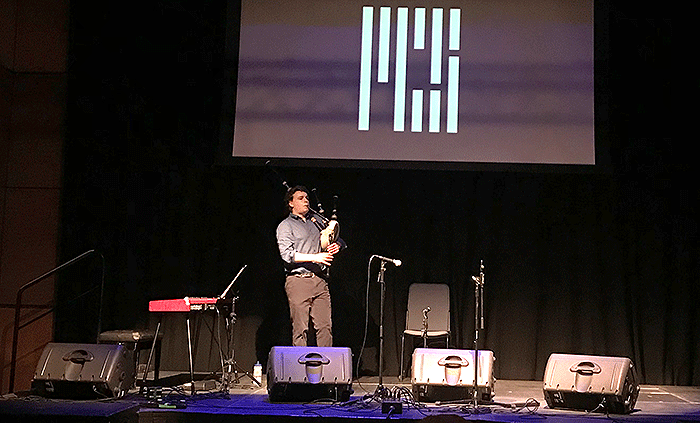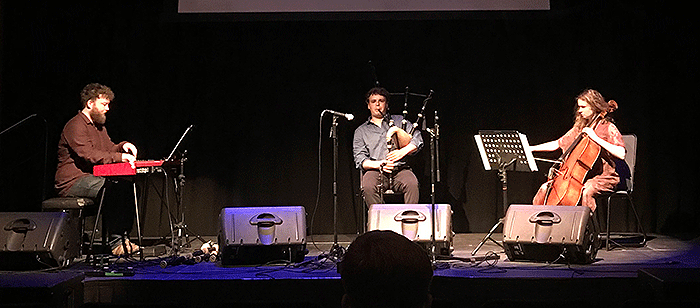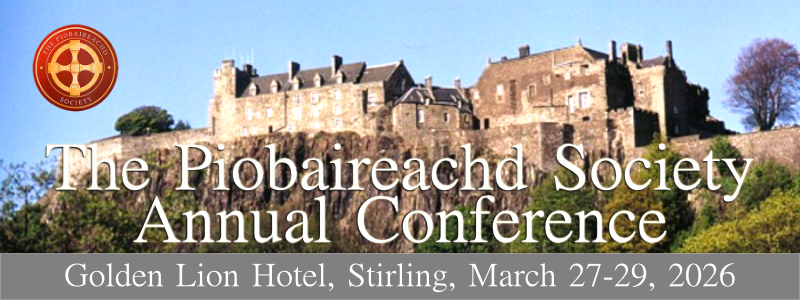
By Robert Wallace
Late one morning earlier this week I attended a concert ‘Our Oldest Tradition’ given by John Dew of Inveraray Pipe Band and one of our foremost young players. The concert was to mark the end of his BMus Trad – Piping degree third year at the Royal Conservatoire of Scotland.
The performance was given in the Centre for Contemporary Arts in Glasgow’s Sauchiehall Street. Such is the run down state of the once glamorous thoroughfare that the CCA provides a welcome artistic oasis midst all the gloom.
A small but knowledgeable crowd gathered to hear John perform a programme of ceol mor and ceol beag. It was pleasing to see his teacher Anne Spalding in the audience.
She has made a fine job of him. John has exemplary technique and knows his way round a bagpipe making it easy for all the tutors who now supplement Anne’s exact grounding. No shortcuts were taken with young John.
He began with the urlar, urlar doubling and first variation of Lament for the Children. He wore no kilt and the bag was uncovered. The tune was a basic interpretation, as one might expect from a young piper, and would have benefited from nuance and pulse.
[wds id=”2″]
I was surprised he did not play a taorluath and crunluath, but the pipes may have been bothering him as they were considerably adrift by the end of Var 1.
Each set was introduced by a faceless voiceover which the recitalist, given his easy way with people, could have done himself. Big brother spoke once more and John launched into the Battle of Strome.
The pipe really came into its own here. Excellent in every way: balance, tone, steadiness. The tune was rather rushed however and I hope John wasn’t reading too much into the name. He lost the melodic turn C to D at the ends of the variations as a result of his pushiness, and the cadences were slightly imbalanced. Overall an enjoyable tune only requiring a few tweaks to bring it to a higher performance level.
More creepy voiceovers and then into the Massacre of Glencoe, purportedly as the MacDonald/MacArthur records suggest it be played. The least said the better.
John concluded with a fine selection of melodies (cleverly incorporating parts of the Prince’s Salute) accompanied by cello (Ellen Gira) and keyboard (Michael Biggins). Together they have the making of a professional ensemble.
Good intonation on the Bb pipes (apart from the shakey, false fingered incidentals) and a slight lack of cohesion at the overfast reels. All told really excellent playing from the trio and it brought the concert to a rousing finish.

In his programme note John wrote: ‘Because of competition, our perception of the art form of piobaireachd is leading to standardisation of the interpretation of the music and therefore limits its musical possibilities as pipers compete for a prize and will play safe….as opposed to aiming to create good music.’
That is very true, but the answer lies in better tuition, better judging and more detailed study of the music. There are limitless possibilities in piobaireachd expression, but throw away the traditional parameters within which we must perform and you throw away the art form itself.
The Conservatoire authorities are putting their charges on the line when they hold these public concerts. It is a serious test of a young student’s performance mettle. John passed this audition with considerable distinction.
In closing I would say this: John Dew is a very personable young man with an exciting future ahead of him. I hope he doesn’t get sidetracked away from the platform that will most develop his undoubted talent, the solo piping platform. Make it there John, and you can make it anywhere.
[wds id=”8″]




















